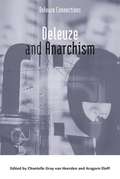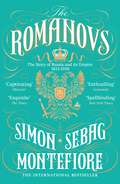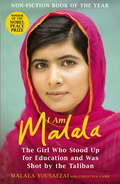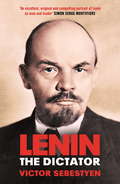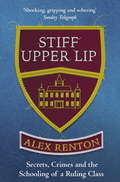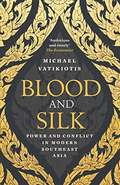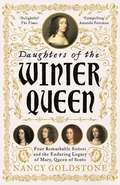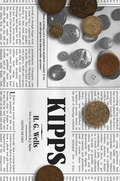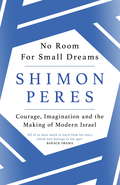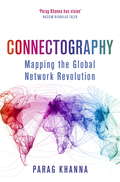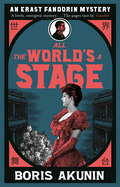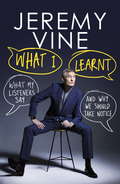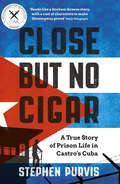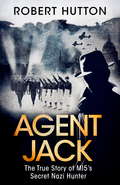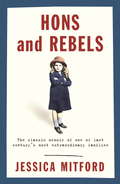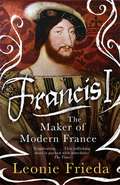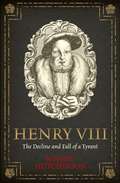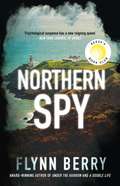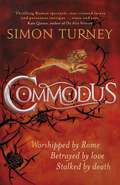- Table View
- List View
Deleuze And Anarchism (Deleuze Connections)
by Chantelle Heerden Aragorn EloffExplores Deleuze and Guattari's own diverse conceptions of anarchism and expands it in the spirit of their philosophy <p><p> This collection of 13 essays addresses and explores Deleuze and Guattari's relationship to the notion of anarchism: in the diverse ways that they conceived of and referred to it throughout their work, and also more broadly in terms of the spirit of their philosophy and in their critique of capitalism and the State. <p> Both Deleuze and Guattari were deeply affected by the events of May '68 and an anarchist sensibility permeates their philosophy. However, they never explicitly sustained a discussion of anarchism in their work. Their concept of anarchism is diverse and they referred to in very different senses throughout their writings. This is the first collection to bring Deleuze and Guattari together with anarchism in a focused and sustained way.
The Romanovs: 1613-1918
by Simon Sebag MontefioreThe Romanovs were the most successful dynasty of modern times, ruling a sixth of the world's surface. How did one family turn a war-ruined principality into the world's greatest empire? And how did they lose it all?This is the intimate story of twenty tsars and tsarinas, some touched by genius, some by madness, but all inspired by holy autocracy and imperial ambition. Montefiore's gripping chronicle reveals their secret world of unlimited power and ruthless empire-building, overshadowed by palace conspiracy, family rivalries, sexual decadence and wild extravagance, and peopled by a cast of adventurers, courtesans, revolutionaries and poets. Written with dazzling literary flair, drawing on new archival research, THE ROMANOVS is at once an enthralling chronicle of triumph and tragedy, love and death, a universal study of power, and an essential portrait of the empire that still defines Russia today.
I Am Malala: The Girl Who Stood Up for Education and was Shot by the Taliban
by Malala Yousafzai Christina Lamb*Winner of the 2014 Nobel Peace Prize*In 2009 Malala Yousafzai began writing a blog on BBC Urdu about life in the Swat Valley as the Taliban gained control, at times banning girls from attending school. When her identity was discovered, Malala began to appear in both Pakistani and international media, advocating the freedom to pursue education for all. In October 2012, gunmen boarded Malala's school bus and shot her in the face, a bullet passing through her head and into her shoulder. Remarkably, Malala survived the shooting.At a very young age, Malala Yousafzai has become a worldwide symbol of courage and hope. Her shooting has sparked a wave of solidarity across Pakistan, not to mention globally, for the right to education, freedom from terror and female emancipation.
Lenin the Dictator
by Victor Sebestyen'A fresh, powerful portrait of Lenin' Anne Applebaum, author of Red Famine'Richly readable ... An enthralling but appalling story' Francis Wheen, author of Karl MarxThe cold, one-dimensional figure of Lenin the political fanatic is only a partial truth. Drawing on extensive material that has only recently become available, Sebestyen's gripping biography casts an intriguing new light on the character behind the politics.In reality, Lenin was a man who loved nature as much as he loved making revolution, and his closest relationships were with women. He built a state based on terror. But he was a highly emotional man given to furious rages and deep passions. While never ignoring the politics, Sebestyen examines Lenin's inner life, his relationship with his wife and his long love affair with Inessa Armand, the most romantic and beguiling of Bolsheviks. These two women were as significant as the men - Stalin or Trotsky - who created the world's first Communist state with him.
Lenin the Dictator: The Man, The Dictator, And The Master Of Terror
by Victor Sebestyen'A fresh, powerful portrait of Lenin' Anne Applebaum, author of Red Famine'Richly readable ... An enthralling but appalling story' Francis Wheen, author of Karl MarxThe cold, one-dimensional figure of Lenin the political fanatic is only a partial truth. Drawing on extensive material that has only recently become available, Sebestyen's gripping biography casts an intriguing new light on the character behind the politics.In reality, Lenin was a man who loved nature as much as he loved making revolution, and his closest relationships were with women. He built a state based on terror. But he was a highly emotional man given to furious rages and deep passions. While never ignoring the politics, Sebestyen examines Lenin's inner life, his relationship with his wife and his long love affair with Inessa Armand, the most romantic and beguiling of Bolsheviks. These two women were as significant as the men - Stalin or Trotsky - who created the world's first Communist state with him.
Stiff Upper Lip: Secrets, Crimes and the Schooling of a Ruling Class
by Alex Renton'A brave and necessary book' GUARDIAN'Shocking, gripping and sobering' SUNDAY TELEGRAPHNo other society sends its young boys and girls away to school to prepare them for a role in the ruling class.Beating, bullying, fagging, cold baths, vile food and paedophile teachers are just some of the features of this elite education, and, while some children loved boarding school, others now admit to suffering life-altering psychological damage. Stiff Upper Lip exposes the hypocrisy, cronyism and conspiracy that are key to understanding the scandals over abuse and neglect in institutions all over the world.Award-winning investigative journalist Alex Renton went to three traditional boarding schools. Drawing on those experiences, and the vivid testimony of hundreds of former pupils, he has put together a compelling history, important to anyone wondering what shaped the people who run Britain in the twenty-first century.
Blood and Silk: Power and Conflict in Modern Southeast Asia
by Michael VatikiotisWhy are Southeast Asia's richest countries such as Malaysia riddled with corruption? Why do Myanmar, Thailand and the Philippines harbour unresolved violent insurgencies? How do deepening religious divisions in Indonesia and Malaysia, and China's growing influence, affect the region and the rest of the world? Thought-provoking and eye-opening, Blood and Silk is an accessible, personal look at modern Southeast Asia, written by one of the region's most experienced outside observers. This is a first-hand account of what it's like to sit at the table with deadly Thai Muslim insurgents, mediate between warring clans in the Southern Philippines and console the victims of political violence in Indonesia - all in an effort to negotiate peace, and understand the reasons behind endemic violence.
Blood and Silk: Power and Conflict in Modern Southeast Asia
by Michael Vatikiotis'A lively and learned guide to the politics, personalities and conflicts that are shaping a dynamic group of countries' FINANCIAL TIMES'A fascinating and many-layered portrait of Southeast Asia' THANT MYINT-UThought-provoking and eye-opening, BLOOD AND SILK is an accessible, personal look at modern Southeast Asia, written by one of the region's most experienced outside observers. This is a first-hand account of what it's like to sit at the table with deadly Thai Muslim insurgents, mediate between warring clans in the Southern Philippines and console the victims of political violence in Indonesia - all in an effort to negotiate peace, and understand the reasons behind endemic violence.Peering beyond brand new shopping malls and shiny glass towers in Bangkok and Jakarta, Michael Vatikiotis probes the heart of modern Southeast Asia. Why are the region's richest countries such as Malaysia riddled with corruption? Why do Myanmar, Thailand and the Philippines harbour unresolved violent insurgencies? How do deepening religious divisions in Indonesia and Malaysia and China's growing influence affect the region and the rest of the world?Vatikiotis tells the story of modern Southeast Asia using vivid portraits of the personalities who pull the strings, mixed with revealing analysis that is underpinned by decades of experience in the countries involved, from their silk-sheathed salons to blood-spattered streets. The result is a fascinating study of the dynamics of power and conflict in one of the world's fastest growing regions.
Daughters of the Winter Queen: Four Remarkable Sisters, the Crown of Bohemia and the Enduring Legacy of Mary, Queen of Scots
by Nancy Goldstone'What a compelling read! Nancy Goldstone has brought to life the four female Stuarts in all their tragic glory' Amanda ForemanValentine's Day, 1613. Elizabeth Stuart, the sixteen-year-old granddaughter of Mary, Queen of Scots, marries Frederick V, a German count and ally of her father, James I of England. In just five years a terrible betrayal will ruin 'the Winter Queen', as Elizabeth will forever be known, imperil the lives of those she loves and launch a war that lasts thirty years.In a sweeping narrative encompassing political intrigue, illicit love affairs and even a murder mystery, Nancy Goldstone tells the riveting story of a queen in exile, and of her four defiant daughters.
Kipps: With an introduction by D.J. Taylor
by H.G. Wells'FIRST ELECTRICITY. AND THEN TELEPHONES. I FEEL AS IF I WERE LIVING IN AN H G WELLS NOVEL' DOWAGER COUNTESS OF GRANTHAM'You can enjoy the novel as a jolly yarn about faux pas - there's a bit of Kipps in most of us - but you also sense that Wells found its theme a little close to the bone . . . As social inequality threatens to rise, it's hard not to wonder - despite the happy ending - if Kipps belongs to britain's future as well as its past' GuardianOrphaned at an early age, raised by his aunt and uncle, and apprenticed for seven years to a draper, Artie Kipps is stunned to discover upon reading a newspaper advertisement that he is the grandson of a wealthy gentleman and the inheritor of his fortune. Thrown dramatically into the upper classes, he struggles desperately to learn the etiquette and rules of polite society. But as he soon discovers, becoming a `true gentleman' is neither as easy nor as desirable as it at first appears...
No Room for Small Dreams: Courage, Imagination and the Making of Modern Israel
by Shimon PeresIn 1934, eleven-year-old Shimon Peres emigrated to the land of Israel from his native Poland, leaving behind an extended family who would later be murdered in the Holocaust. Few back then would have predicted that this young man would eventually become one of the towering figures of the twentieth century. Peres would indeed go on to serve the new state as prime minister, president, foreign minister, and the head of several other ministries. In this, his final work, finished only weeks before his passing, Peres offers a long-awaited examination of the crucial turning-points in Israeli history through the prism of having been a decision-maker and eyewitness. Told with the frankness of someone aware this would likely be his final statement, No Room for Small Dreams spans decades and events, examining pivotal moments in Israel's rise. Peres explores what makes for a great leader, how to make hard choices in a climate of uncertainty and distress, the challenges of balancing principles with policies, and the liberating nature of imagination and unpredicted innovation. In doing so, he not only charts a better path forward for his beloved country but provides deep and universal wisdom for younger generations who seek to lead - be it in politics, business or the broader service of making our planet a safer, more peaceful and just place.
Connectography: Mapping the Global Network Revolution
by Parag KhannaWhich lines on the map matter most?It's time to reimagine how life is organized on Earth. In Connectography, Parag Khanna guides us through the emerging global network civilization in which mega-cities compete over connectivity and borders are increasingly irrelevant. Travelling across the world, Khanna shows how twenty-first-century conflict is a tug-of-war over pipelines and Internet cables, advanced technologies and market access.Yet Connectography also offers a hopeful vision of the future - beneath the chaos of a world that appears to be falling apart, a new foundation of connectivity is pulling it together.
All The World's A Stage: Erast Fandorin 11 (Erast Fandorin Mysteries)
by Boris AkuninTHE 11TH BOOK IN THE BESTSELLING ERAST FANDORIN MYSTERIES SERIESEBRD LITERATURE PRIZE FINALIST'This is Akunin on characteristic form... the pages race by' GuardianEliza Altairsky-Lointaine is the toast of Moscow society, a beautiful actress in an infamous theatre troupe. Her love life is as colourful as the parts she plays. She is the estranged wife of a descendant of Genghis Khan. And her ex-husband has threatened to kill anyone who courts her.He appears to be making good on his promise.Fandorin is contacted by concerned friend - the widowed wife of Chekhov - who asks him to investigate an alarming incident involving Eliza. But when he watches Eliza on stage for the first time, he falls desperately in love . . . Can he solve the case - and win over Eliza - without attracting the attentions of the murderer he is trying to find?What readers are saying about the Erast Fandorin Mysteries:'I loved how it consumes you, making you believe that you're indeed living in different era' Olga on Goodreads (five stars)'A delightful mystery/adventure! There's a dark twist at the end that has me anxious to continue in this series' Neil on Goodreads (five stars)'These books are a fun, riotous read that you don't want to put down until you've completed each and every one of them' Jill on Goodreads (five stars)'Every sentence is a delight to read... I am almost feeling bereft now that I have once more run out of English copies of Akunin's work.' Kate on Goodreads (five stars)A page-turning delight perfect for fans of Sherlock Holmes, Hercule Poirot and the Russian literary greats. Shortlisted for the inaugural EBDR Literature Prize.
What I Learnt: What My Listeners Say and Why We Should Hear Them
by Jeremy VineJeremy Vine has been presenting a BBC Radio 2 show since 2003 that attracts more than seven million listeners. In that time he calculates he has taken more than 25,000 calls on topical subjects - big issues and small ones: on life, love, lollipop ladies and poisonous plants. But what have the callers told him? In the age of Brexit and Donald Trump, is the world now being run by Radio 2 listeners? If you listen to Radio 4, Brexit was a shock. If you are a Radio 2 listener it wouldn't have surprised you at all. Where Jeremy's callers once expressed a kind of resignation ('But what can you do?' or the gloomy rejoinder: 'You have to laugh'), now they tend to give him their views expecting to be heeded. They have not called in to entertain the audience. They expect to take the wheel of the car and drive.Listener wisdom is far more valuable than most of what we hear from appointed spokespeople. What was the response when Jeremy asked: 'Have you ever been pecked in the eye by a gannet?' Which subjects are most likely to start pitched warfare between different sections of the audience? (Answer: old people using buses, old people NOT using buses, cellophane, or Tony Blair saying anything.)In a book punctuated by vivid anecdotes and laugh-out-loud moments, Jeremy Vine explains what it's like to hit a button and hear - totally unvarnished and unspun - the voices of so-called ordinary people. And why they are not so ordinary after all.
Your Call: What My Listeners Say – and Why We Should Take Note
by Jeremy Vine'Full of glorious examples of caller wisdom [with] laugh-out-loud anecdotes' Allison PearsonHaving taken over 25,000 listener calls on his BBC Radio 2 lunchtime show, Jeremy Vine decided it was time to take stock of the wisdom his listeners have imparted over the airwaves. And it is clearer than ever before that caller wisdom is far more valuable than most of what we hear from 'the experts'. The voice of the so-called 'ordinary person' - totally unvarnished and unspun - turns out to be not so ordinary after all.These moments of truth could not have come at a more pertinent time - with world politics, war and Brexit in the fray. And it always helps to make people laugh. This is his hilarious account of lessons learnt from listeners, life and Len Goodman by way of musings on everything including love, lollipop ladies and poisonous plants.
Close But No Cigar: A True Story of Prison Life in Castro's Cuba
by Stephen PurvisWINNER OF THE CRIME WRITERS' ASSOCIATION GOLD DAGGER FOR NON-FICTION 2017'In its tragic absurdity, Close But No Cigar reads like a Graham Greene story, with a cast of characters to make Hemingway proud' Daily TelegraphFor over a decade Stephen Purvis had been a pillar of Havana's expat community, one of many foreign businessmen investing in Cuba's crawl from Cold War communism towards modernity. But for reasons unknown to him he was also under State Security's microscope. One morning during the height of President Raúl Castro's purges in 2012, while his family slept, the unmarked Ladas of State Security arrived at his home and he was taken away into the absurd and brutal world of Cuban justice.In this engrossing memoir, Purvis recounts his fifteen-month ordeal. Accused at first of selling state secrets, he is taken to the notorious interrogation centre Villa Marista, where he endures brutal conditions designed by the KGB and Stasi to break the bodies and minds of spies and political prisoners, and resists the paranoia and incompetence of his jailers. Later, held in a maximum-security prison, he finds himself surrounded by a motley crew of convicts: people-smugglers and drug-runners together with a handful of confused businessmen also awaiting formal charges.From his arrest to his farcical secret trial and sudden release, Purvis exposes the madness of modern Cuba with wit, grit and a sharp eye for character. As tourists flock to Havana to marvel at a city frozen in time, he shows that despite reforms and international reconciliation the Castro regime remains a corrupt, dictatorial relic. Close But No Cigar is part thriller, part comedy and part morality tale, but most of all a true story that takes the reader into a dark side of a sunny place that remains an enigma.
Close But No Cigar: A True Story of Prison Life in Castro's Cuba
by Stephen Purvis'In its tragic absurdity, Close but No Cigar reads like a Graham Greene story, with a cast of characters to make Hemingway proud ... [This] tale should be read by anyone who wants to understand what lies beyond the beaches and Bacardi [of Cuba]' DAILY TELEGRAPHFor over a decade Stephen Purvis had been a pillar of Havana's expat community, one of many foreign businessmen investing in Cuba's crawl from Cold War communism towards modernity. But for reasons unknown to him he was also under State Security's microscope. One morning during the height of President Raúl Castro's purges in 2012, while his family slept the unmarked Ladas of State Security arrived at his home and he was taken away into the absurd and brutal world of Cuban justice.In this engrossing memoir, Purvis recounts his fifteen-month ordeal. Accused at first of selling state secrets, he is taken to the notorious interrogation centre Villa Marista, where he endures brutal conditions designed by the KGB and Stasi to break the bodies and minds of spies and political prisoners, and resists the paranoia and incompetence of his jailers. Later, held in a maximum-security prison, he finds himself surrounded by a motley crew of convicts: people-smugglers and drug-runners together with a handful of confused businessmen also awaiting formal charges.From his arrest to his farcical secret trial and sudden release, Purvis exposes the madness of modern Cuba with wit, grit and a sharp eye for character. As tourists flock to Havana to marvel at a city frozen in time, he shows that despite reforms and international reconciliation the Castro regime remains a corrupt, dictatorial relic. CLOSE BUT NO CIGAR is part thriller, part comedy and part morality tale, but most of all a true story that takes the reader into a dark side of a sunny place that remains an enigma.
Agent Jack: The True Story of MI5's Secret Nazi Hunter
by Robert Hutton'Highly readable' Ben Macintyre'Pacy, original and frequently chilling' Henry HemmingJune 1940. Britain is Europe's final bastion of freedom - and Hitler's next target. But not everyone fears a Nazi invasion. In factories, offices and suburban homes are men and women determined to do all they can to hasten it.Throughout the Second World War, Britain's defence against the enemy within was Eric Roberts, a former bank clerk from Epsom. Equipped with an extraordinary ability to make people trust him, he was recruited into the shadowy world of espionage by the great spymaster Maxwell Knight. Roberts penetrated first the Communist Party and then the British Union of Fascists, before playing his greatest role for MI5 - as Hitler's man in London. Codenamed Jack King, he single-handedly built a network of hundreds of British Nazi sympathisers, with many passing secrets to him in the mistaken belief that he was a Gestapo officer. Operation Fifth Column, run by a brilliant woman scientist and a Jewish aristocrat with a sideline in bomb disposal, was kept so secret it was omitted from the reports MI5 sent to Winston Churchill. In a narrative that grips like a thriller, Robert Hutton tells the fascinating story of an operation whose existence has only recently come to light. Drawing on newly declassified documents and private family archives, Agent Jack shatters the comfortable notion that Britain could never have succumbed to fascism, and celebrates - at last - the courage of individuals who protected the country they loved at great personal risk.
Hons and Rebels: The Mitford Family Memoir (W&N Essentials)
by Jessica Mitford'This book is just about my favourite book of all time ... I'm not entirely convinced I could like somebody who didn't like this book ... it's funny and moving and gives you an insight into this extraordinary moment as the war is about to begin ... it's so vivid, and what's more, it's incredibly current' Robert Rinder, BBC Radio 4'Wonderfully funny and very poignant' Philip Toynbee'More than an extremely amusing autobiography ... she has evoked a whole generation. Her book is full of the music of time' SUNDAY TIMES'Whenever I read the words "Peer's Daughter" in a headline,' Lady Redesdale once sadly remarked, 'I know it's going to be something about one of you children.' The Mitford family is one of the century's most enigmatic, made notorious by Nancy's novels, Diana's marriage to Sir Oswald Mosley, Unity's infatuation with Hitler, Debo's marriage to a duke and Jessica's passionate commitment to communism. Hons and Rebels is an enchanting and deeply absorbing memoir of an isolated and eccentric upbringing which conceals beneath its witty, light-hearted surface much wisdom and depth of feeling.
Hons and Rebels: The Mitford Family Memoir
by Jessica Mitford'Whenever I read the words "Peer's Daughter" in a headline,' Lady Redesdale once sadly remarked, 'I know it's going to be something about one of you children.' The Mitford family is one of the century's most enigmatic, made notorious by Nancy's novels, Diana's marriage to Sir Oswald Mosley, Unity's infatuation with Hitler, Debo's marriage to a duke and Jessica's passionate commitment to communism. Hons and Rebels is an enchanting and deeply absorbing memoir of an isolated and eccentric upbringing which conceals beneath its witty, light-hearted surface much wisdom and depth of feeling.
Francis I: The Maker of Modern France
by Leonie FriedaFrancis I (1494-1547) was inconstant, amorous, hot-headed and flawed. Arguably he was also the most significant king that France ever had. A contemporary of Henry VIII of England, Francis saw himself as the first Renaissance king. A courageous and heroic warrior, he was also a keen aesthete, an accomplished diplomat and an energetic ruler who turned his country into a force to be reckoned with. Bestselling historian Leonie Frieda's comprehensive and sympathetic account explores the life of the most human of all Renaissance monarchs - and the most enigmatic.
Francis I: The Maker of Modern France
by Leonie FriedaFrancis I (1494-1547) was inconstant, amorous, hot-headed and flawed. Arguably he was also the most significant king that France ever had. A contemporary of Henry VIII of England, Francis saw himself as the first Renaissance king. A courageous and heroic warrior, he was also a keen aesthete, an accomplished diplomat and an energetic ruler who turned his country into a force to be reckoned with. Bestselling historian Leonie Frieda's comprehensive and sympathetic account explores the life of the most human of all Renaissance monarchs - and the most enigmatic.
Henry VIII: The Decline and Fall of a Tyrant
by Robert HutchinsonThe Tudors retained only a precarious grip on the crown of England, founded on a title that was both tenuous and legally flimsy. This left them preoccupied by two major obsessions: the necessity for a crop of lusty male heirs to continue the bloodline, and the elimination of threats from dynastic rivals. None was cursed more by this rampant insecurity than Henry VIII, who embodied not only the power and imperial majesty of the monarchy, but also England's military might. His health always had huge political consequences at home and overseas - hence his unbridled hypochondria.Drawing on the latest historical and medical research, Robert Hutchinson reveals the extent to which the king also grappled with accelerating geriatric decay in his last six years, made more acute by medical conditions that were not only painful but transformed the monarch into a 28-stone psychotic monster, suspicious of everyone around him, including those most dear to him.
Northern Spy: A Reese Witherspoon's Book Club Pick
by Flynn BerryTHE INSTANT NEW YORK TIMES BESTSELLERA REESE'S BOOK CLUB PICK'You'll devour Northern Spy . . . I loved this thrill ride of a book'Reese Witherspoon'A sharp, moving thriller: you lose your breath for adrenalin'Abigail Dean, author of Girl A'An exciting thriller... A domestic noir with a difference'Adrian McKinty, author of The Chain'A chilling, gorgeously written tale'New York Times'Nerve-shredding suspense'Daily Mail'Thrillingly good... Flynn Berry shows a le Carré-like flair for making you wonder what's really going on at any given moment'Washington Post A producer at the Belfast bureau of the BBC, Tessa is at work one day when the news of another IRA raid comes on the air: as the anchor requests the public's help in locating those responsible for this latest attack - a robbery at a gas station - Tessa's sister Marian appears on the screen, pulling a black mask over her face.The police believe Marian has joined the IRA, but Tessa knows this is impossible. But when the truth of what has happened to her sister reveals itself, Tessa will be forced to choose: between her ideals and her family. Praise for Flynn Berry'Breathtaking . . . Berry writes thrillingly'New York Times'Beautifully paced and satisfyingly ominous'Guardian'Mesmerizingly effective'The Times 'A thrilling page-turner'Paula Hawkins, author of The Girl on the Train'Berry's clever, thrilling writing wound me in and left me heartbroken'Fiona Barton, author of The Widow'What a book! A skillful and compelling exploration of families, crime, and class'Clare Mackintosh, author of I Let You Go
Commodus: The Damned Emperors Book 2 (The Damned Emperors)
by Simon TurneyWorshipped by Rome. Betrayed by love. Stalked by death. Rome is enjoying a period of stability and prosperity. The Empire's borders are growing, and there are two sons in the imperial succession for the first time in Rome's history. But all is not as it appears. Cracks are beginning to show. Two decades of war have taken their toll, and there are whispers of a sickness in the East. The Empire stands on the brink of true disaster, an age of gold giving way to one of iron and rust, a time of reason and strength sliding into hunger and pain.The decline may yet be halted, though. One man tries to hold the fracturing empire together. To Rome, he is their emperor, their Hercules, their Commodus.But Commodus is breaking up himself, and when the darkness grips, only one woman can hold him together. To Rome she was nothing. The plaything of the emperor. To Commodus, she was everything. She was Marcia.
